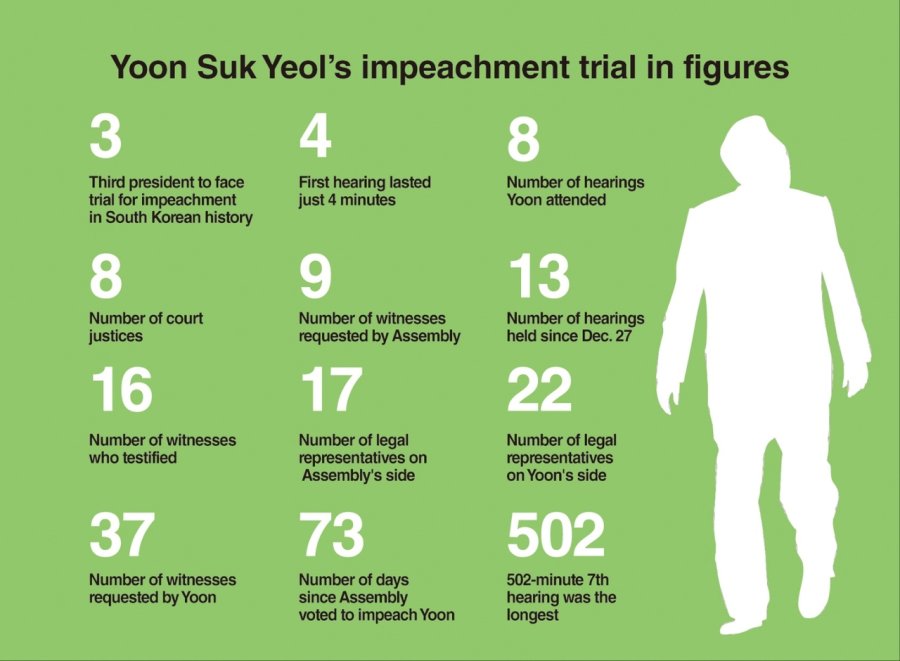February 27, 2025
Seoul – The argument drawn by the Constitutional Court at President Yoon Suk Yeol's impeachment trial on Tuesday ended more than two months of hearing.
During the third presidential impeachment trial in South Korea's history, the court held a total of 11 hearings in 73 days to review the constitutionality and legality of Yoon's martial arts declaration on December 3.
The first preparation hearing took place on December 27, after Yoon refused to accept notice from the court on the impeachment trial and related documents. On January 3, the court completed the preparations at only two meetings and moved to the main hearing.
Starting from the first hearing on January 14, the court conducted a strict schedule once a week, except during the Lunar New Year holiday.
The first hearing lasted only four minutes due to the lack of attendance for safety reasons.

Graphics: The pioneer of South Korea
Sixteen witnesses testified at six hearings, with their position testifying to Yoon's cabinet meeting attempting to impose martial law, and the king allegedly ordered the blockade of the National Assembly and suspected of arresting a list of well-known politicians and public opinion leaders.
Witnesses include former Defense Secretary Kim Yong-hyun, former First Deputy Director of the National Intelligence Agency Hong Jang-Won, suspending the National Police Commissioner Cho ji-Ho, and former Army Special War Commander Lieutenant General Kwak Jong-Geun.
Since his debut at the third hearing, Yoon has actively denied impeachment allegations and repeatedly defended himself, even directly interrogating forward Minister Kim about the number of military deployments and the situation when the No. 1 martial law was drafted.
When Yoon asked him, Kim immediately replied to him, “Now you mentioned it, I remember.”
From the fifth hearing, the main military commander testified, and the court restricted Yin from asking the witness directly. Instead, the suspended president was allowed to make a statement after his legal representative completed their inquiry.
The fifth hearing was followed by the Army Capital Defense Commander Lee Jin-Woo, former commander of defense counterintelligence, Lieutenant General Yeo In-Hyung, and former NIS’s first deputy director, Hong Jang-Won, highlighting Yoon’s list of orders to arrest about 14 major politicians and opinion leaders.
Hong testified that he received a direct order from Yoon on December 3 to delete a list of politicians, journalists and other important figures from the South Korean Arrest Association.
Yoon retorted that his phone call with Hong was just a gesture of encouragement and that he never issued such an order. Hong later appeared in court again, bringing his physical list that night as a witness, Yoon's legal team pointed out the issue with his testimony.
The sixth hearing focused on whether Yoon tried to prevent the National Assembly from lifting its martial law by deploying troops. Former Special War Commander Lieutenant Kwak Jong-Geun declared that Yin instructed him to break the door and forcibly dragged out the MP from the plenary session of the parliament. Yoon argued that Quark's testimony was part of a “political plot” targeting him.
Quark said Yoon told him to “quickly break the door of the National Assembly and drag out everyone”, and it was obvious that the “people” (the “people” in Korean) was the legislator (“Uiwon”).
At the seventh hearing, they convened Baek Jong-Wook, former third deputy director of NIS, who conducted a security audit of the National Election Commission. The National Assembly’s legal team retorted that election fraud had nothing to do with the Yuanbuk case. They gave testimony from Kim Yong-bin, Secretary General of the National Election Commission, to confirm that no election fraud occurred.
At the ninth hearing on February 18, the court reviewed the evidence and arguments presented by both parties. At the tenth hearing, the final witness testimony was from Prime Minister Han Duck-soo of Impotence, former NIS's first deputy director, Hong Jang-Won, and suspended the National Police Commissioner Cho ji-ho.
At the 11th and final hearings, legal representatives of the National Assembly and the Eun-side made a closing statement with Rep. Jung Chung-rae, representing the party prosecuting the case, and the defendant Yoon occupied the floor without time limits.
In the long final argument, Yin apologized for attracting public attention, but stressed that he intended to appeal to the public for the “Imperial Opposition” rather than suppressing the people as the military government did in the past.
Yoon stressed that he would not stick to his term, saying that if he was to be restored, he would focus on constitutional and political reforms in the second half of his term.
“I will work to quickly promote constitutional amendments according to the will of the people, establish constitutional and political structures, and align with the changes in our society.”
He also noted that he would delegate his power to the Prime Minister to preside over domestic issues, citing a rapidly changing international landscape and complex global crises.
Before the final debate in the Yuan Dynasty, Rep. Jung Chung-rae, who represented the Impotence Committee of the National Assembly, argued that for democracy and national progress, it was necessary to be removed from the office. ”
“(On the evening of December 3, on the night of the night of the rebellion, the entire country watched the violence of armed soldiers on TV. “The leaders of the blasting uprising suspected that the necessary conditions for Yoon Suk Yeol were met,” he said.
“The sky clearly heard the deafening roar of martial law helicopters, and witnesses on the ground witnessed the marching boots of armed martial law. Even the moon's reflection on the lake was a witness,” he added.
Kim Gye-Ri, a member of Yoon's legal team, spoke in the ending of the debate, also attracted some circles of attention.
After the hearing, the court will announce the date of the ruling after deliberation and the vote of the eight judges. A final ruling is expected to be made around mid-March.




